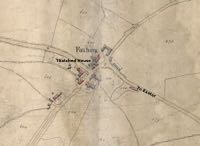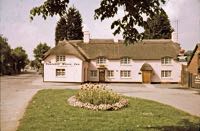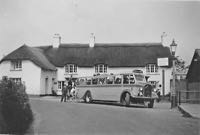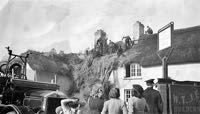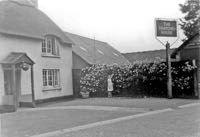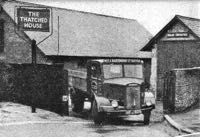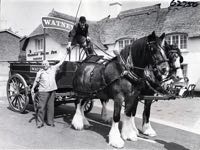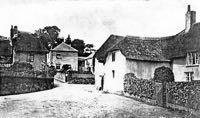
Thatched House – Foxhayes
Page updated 23rd March 2016
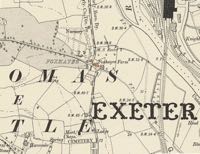 Situated in Exwick Road,
on the west side of the
river, this pub dates from the 1600's and was originally a farmhouse
for Foxhaye's Farm.
Situated in Exwick Road,
on the west side of the
river, this pub dates from the 1600's and was originally a farmhouse
for Foxhaye's Farm.
The 1839 tithe map shows the farm buildings and fields around about. The owner was James Wentworth Buller MP, General Buller's father, and the tenant was Henry Patch who farmed a little over 25 acres at a yearly rent of £10 10s 6d. The fields attached to the farm were listed as, Orchard, Higher Marsh, Merry Field, Long Marsh and Foxhay's Marsh. They were all used as pasture, probably for mixed beef and dairy. The farm, of 24 acres, now occupied by Mrs Ware, came up for let in December 1848 for a term of 7 or 10 years.
A sale in July 1858, due to the next tenant Mr George Webber quitting, indicates the farm concentrated on grain. Hay, apples, cider and casks, timber including planks and faggots were listed, and livestock of twenty fat sheep, two rams, and two heifers. However, the main crop appears to have been seventeen acres of standing corn and nineteen acres of barley.
The next tenant, Mr George Timewell, auctioned his produce, when he quit, in 1862. The list indicates that he concentrated on livestock and grew grass for hay, along with swede, turnips and potatoes. As the advert was directed towards graziers, butchers and dairyman, the livestock probably consisted of a mix of beef and dairy cattle.
When in 1874, the farm was occupied by Mr John Robins, the West of England, the Sun and the Norwich Union Fire appliances were called to douse a fire in an outbuilding attached to the farm. By 1881 Foxhayes Farm had expanded to 100 acres. The farmer was still Mr Robins, who employed 5 labourers. There were orchards attached to the farm which were often the target of scrumping small boys, who Mr Robins would prosecute when caught. The farm had land on each side of the Exwick Road – the land to the west, towards Cleve was rising, while that to the east was flat water meadow. The flat land was often used by local organisations and schools including Holy Trinity Sunday School, and the St Johns Hospital School, to hold games and sports days for the children, a practice that continues, as the land is now the Exwick football fields.
Although Foxhayes was a quiet rural area, just outside the city, it still suffered from poor sewage disposal and drainage. In 1882, the St Thomas Board of Health reported that the cesspit system for Foxhayes properties should be replaced, by piping the effluent into a large holding tank, on Mr Robins land, and the overflow from the tank discharged into the river about 400 yards (380 metres) from the Exwick Road. The present system was prone to offensive smells, and two recent cases of typhoid in cottages in Foxhayes were said to originate from the emptying of the cesspits.
The 1893 Post Office directory has the entry Exwick Road - Kerslake, John, farmer, Foxhayes Farm – he was still in residence in 1913.
In 1914, Besley's list Albert Henry Guy as a farmer and haulage contractor of Foxhayes – Guy's Road, close by, is named after him. In 1922, the long time owners, the Buller's sold the farm to Mr Eastmond, with Albert Guy continuing as tenant.
Probably in the early 1930s, the road layout around the farmhouse changed - the Exwick Road towards St Thomas once ran in front of the farmhouse, and then turned right towards St Thomas, in front of the houses. An end gable of the farmhouse was also demolished, to allow Exwick Road to run straight, past the end of the farmhouse.
The farmhouse becomes cottages
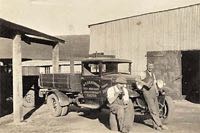 By 1932 the farmhouse had been divided into two cottages by its owner
Mr Eastmond, who is listed in 1935 as W T J Eastmond Ltd., cider
manufacturers.
By 1932 the farmhouse had been divided into two cottages by its owner
Mr Eastmond, who is listed in 1935 as W T J Eastmond Ltd., cider
manufacturers.
Left–Wilfred and Reg drink cider in Eastmonds Yard.
Ivor Trivett who was a baby at the time explains:
"In about 1932 my father Wilfred Trivett met Reg Lobb in a pub where else, one Friday night and Reg said that he was going to see about a job next morning, Father decided to go along with him. They agreed to meet in the morning, when Reg did not arrive, Father went to get him only to find that Reg was still in bed, they finally arrived at Eastmond's yard in Exwick and Mr Eastmond gave Reg a job as a lorry driver, Father ask if there was another job available Mr Eastmond told him that he could have a job working in the yard which was accepted but he lived at Upton Pyne and wanted to move, so Mr Eastmond offered one of the farm cottages and he had a choice of two, Reg asked if he could have the other one but he was not married and was refused, (he) asked that if he got married by next Saturday could he have one which was agreed, Reg married Lou and moved in next door to Father, I was a baby at the time, we become long lasting family friends. I believe that Mr Eastmond brought the land and the three cottages because he built Exwick Villas when the last pair of semi-detach was near completion. Father and Reg had to move out of the cottages and move there because Mr Eastmond had sold the cottages."
The pub and Eastmonds Yard
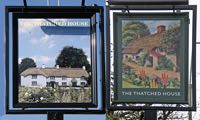 The year 1937 saw the building vacated and
converted into a public house with E W Shire running the pub. Ivor
Trivett also reminisced about the pub:
The year 1937 saw the building vacated and
converted into a public house with E W Shire running the pub. Ivor
Trivett also reminisced about the pub:
"The Thatched House Inn became Father and Reg's favourite Pub and when I was growing up before the war knew the Squires family, late 1940 me and my Mother had to move away and it was not until I was 18 that I met up with Mrs M Squire, I was staying with Reg and Lou Lobb for the weekend, me and Reg went on the town before going to see Exeter City football match, afterwards we called into a few Pubs before arriving at The Thatch which had just closed at 10pm, Reg knock on the door and Mrs Squire came and told him to go home, they was closed, then she noticed me cried out you must be Ginger Trivett's son, come on in, it was gone 12-O-Clock before we left."
On 2 March 1947 the pub suffered damage to the roof when a chimney fire spread to the thatch. At about 1.30pm Mrs Shire noticed lumps of soot falling into the fireplace. Customers entering the pub reported that the thatch near the chimney was on fire. They fetched ladders and attempted to put out the flames before the fire brigade arrived. About 20 firemen of the NFS arrived and proceeded to put out the fire. About a third of the thatch was removed to prevent the fire spreading, and furniture was removed from the premises. The fire was extinguished by 2.30pm.
It has recently been refurbished and the outside painted cream, and the thatched roof renewed. The interior is very cottagey with little side rooms and inglenook fireplaces. They have a good menu, if you are feeling hungry and also offer wireless internet access.
Source: Reminisces of Wilfred Ivor Trivett, Two Thousand Years in Exeter by W G Hoskins, West of the River by Hazel Harvey, the Flying Post and various trade directories.
│ Top of Page │
